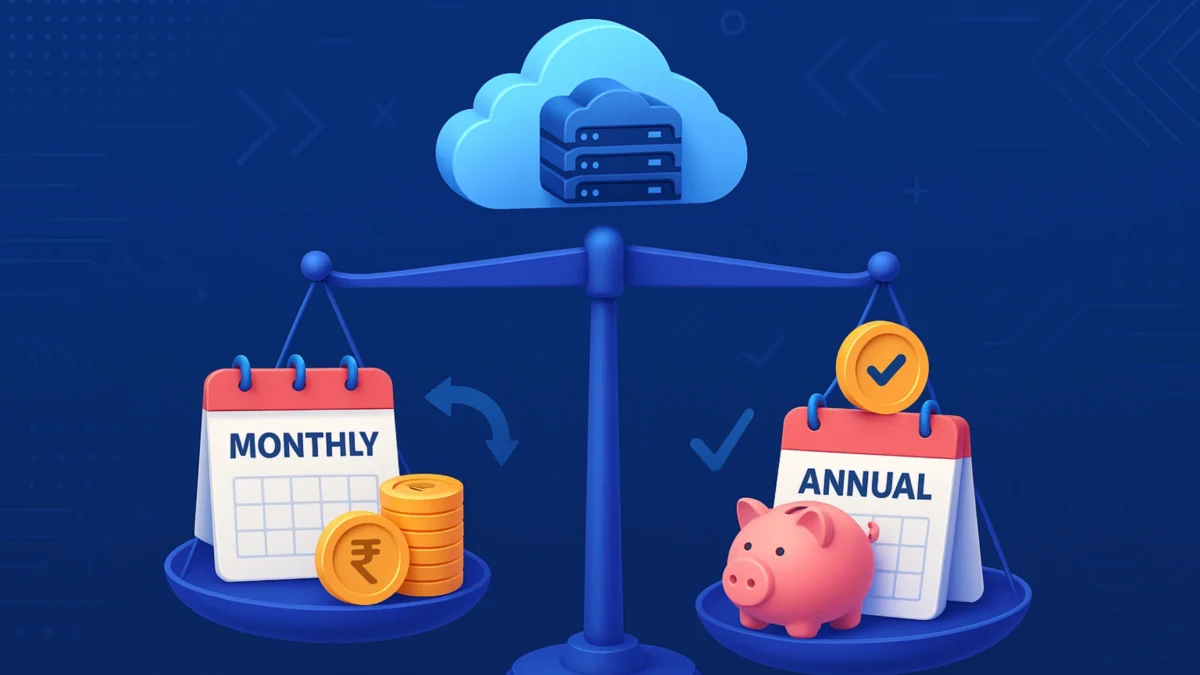Cloud hosting has reinvented itself as the backbone of business in the modern world, providing websites, applications and enterprise-level systems with scalability and reliability. A key selection choice to consider when purchasing a hosting, a company will be whether to pay on a monthly or annual basis. On the one hand, this might appear to be a mere money decision, but the billing cycle has some underlying context that influences flexibility, budgets, and value in the long-term.
This discussion will decompose the pros and cons of monthly or annual billing of cloud hosting, as well as the factors that should be considered when determining which cloud hosting model better meets your needs.
Monthly Billing: Flexibility At A Price
Pros of Monthly Billing
- Low commitment and Flexibility: Monthly billing offers you the option of cancelling or changing providers with short notice. This is particularly useful in the case of a startup, experimental project, or business that is still trying to assess which cloud host fits them.
- Cost-Effective to Cash Flow: Rather than making a huge lump sum payment, monthly billing is a way to spread out costs, and it is easier to manage cash flow among small businesses or freelancers.
- Easier to Scale or Exit: In case your hosting requirements increase or decrease, monthly agreements allow you to increase or decrease scaling without committing to a 1-year contract. On a bad performance, you can quit without being charged any money.
- Best when used on short term projects: Tests a new application, provides a campaign website or operates a seasonal business? The monthly billing is a way of ensuring that you only pay the time that you actually utilize the service.
Cons of Monthly Billing
- Higher Cost in the Long Run: Monthly billing often comes with a premium price tag. Providers typically charge more per month compared to the annual equivalent.
- Unpredictable Long-Term Expenses: Over time, monthly payments may add up to a larger total cost, especially if your project runs for years.
- Potential for Service Interruptions: If you forget to renew or face payment issues, you risk service suspension more frequently compared to annual billing.
Annual Billing: Savings Through Commitment
Pros of Annual Billing
- Cost Savings: Cloud hosting providers usually offer significant discounts sometimes up to 20–30% for customers who commit to a yearly plan. This can translate into substantial savings over time.
- Budget Stability: With a one-time payment, you know exactly what your hosting expenses will be for the year. This makes financial planning easier for businesses with predictable hosting needs.
- Fewer Administrative Hassles: Instead of managing monthly invoices and renewals, annual billing reduces administrative overhead, freeing up time for more critical business tasks.
- Bonus Perks: Some providers add extra benefits (like free domain registration, SSL certificates, or priority support) for annual subscribers.
Cons of Annual Billing
- Large Upfront Payment: The biggest drawback is the high initial cost. Not every business, especially startups or individuals, can afford to tie up funds in a lump sum.
- Reduced Flexibility: If your needs change mid-year, you’re still financially committed. Switching providers or canceling early usually means forfeiting your payment.
- Risk of Lock-In: Committing annually locks you into one provider. If their performance declines, you’re stuck until your contract ends, unless you’re willing to absorb the loss.
- Over-Commitment: If you overestimate your hosting needs and commit to a higher plan annually, you may end up paying for unused resources.
Monthly vs Annual Billing: Which Should You Choose?
The decision between monthly and annual billing depends largely on your business stage, financial situation, and risk tolerance. Here’s how to think about it:
Choose Monthly Billing If:
- You’re a startup, freelancer, or small business with tight cash flow.
- You’re still testing cloud hosting providers or comparing performance.
- Your project is temporary or experimental.
- You anticipate rapid scaling, pivots, or changes in hosting needs.
Choose Annual Billing If:
- You have a stable, long-term project (e.g., an established e-commerce site).
- You want to maximize savings and minimize administrative overhead.
- You trust the hosting provider and are satisfied with their service quality.
- You have enough financial buffer to make a one-time payment without stress.
Key Points to Consider Before Deciding
When evaluating monthly vs annual billing, go beyond just pricing. Consider these factors:
- Nature of Your Project: A new start up venture must consider flexibility first whereas an established firm enjoys annual discounts.
- Financial Position: Can you comfortably afford an upfront payment without affecting cash flow? If not, monthly billing is safer.
- Growth Projections: If you expect rapid scaling, monthly plans let you adjust resources as needed. Annual plans may limit adaptability unless the provider offers easy upgrades.
- Provider’s Reputation: Only commit annually if you’re confident in the hosting provider’s reliability, uptime, and support.
- Contract Terms: Read the fine print. Some providers offer prorated refunds for cancellations, while others don’t.
- Hidden Costs: See whether such features as backups, bandwidth, or SSL certificates are provided. Sometimes, annual plans include perks that reduce overall expenses.
- Risk of Provider Changes: Providers occasionally update pricing or policies. With annual billing, you lock in the current rate, but you also risk being tied to outdated features if better plans emerge.
A monthly vs annual billing of Cloud Hosting does not have an easy to apply rule. Monthly plans are flexible and ideal in businesses that are trying the waters or businesses with tight budgets. Annual plans, however, present economies of scales and predictability to already-established projects that have predictable needs.
Finally, the decision is up to you depending on your financial comfort, the life cycle of projects and trust in your hosting company. The clever solution may also be to pay monthly, test the service, and then move to annual payment as soon as you can be sure that the provider is reliable.
With proper considerations of the advantages and disadvantages, you can match your expenses in hosting with your business objectives and also you are not only saving money but also achieving the flexibility and peace of mind that you require.






